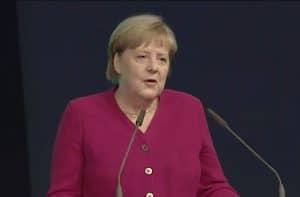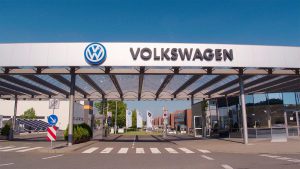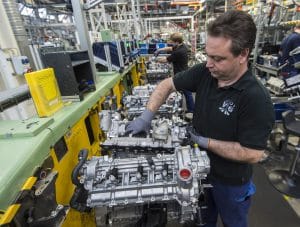
German Chancellor Angela Merkel said Germany has won a “fragile intermediate success” against the coronavirus.
Hit hard and hit early by the global coronavirus pandemic, Europe is now hoping to start getting its economy back in running order – with the auto industry leading the charge.
Hyundai was first out of the box, relaunching operations at a Czech plant on Tuesday. A number of other leading automakers expect to resume production next week, at least at some of their plants, including Volkswagen, Mercedes-Benz, Volvo and Toyota, with Peugeot working out final details meant to preserve worker safety and restart operations.
Those moves will follow cautiously upbeat pronouncements by European leaders, including German Chancellor Angela Merkel who, on Wednesday, said her nation has won a “fragile intermediate success” in the battle against the coronavirus.
(Automakers pressed to reopen plants, but face major obstacles.)
In most cases, automakers are expected to ramp things up slowly, starting with one or two plants operating at reduced line rates.

Volkswagen is looking at restarting plants in Europe soon, beginning with its site in Zwickau, Germany.
“With the decisions by the federal and state governments in Germany and the loosening of restrictions in other European states, conditions have been established for the gradual resumption of production,” Ralf Brandstätter, the chief operating officer of the Volkswagen brand, said in a statement.
The world’s largest automaker – which is already back in operation at 32 of its 33 plants in China – plans to start off in Europe with its plants in Zwickau, Germany, and the Slovak capital of Bratislava. Other facilities in Portugal, Russia and Spain – as well as the U.S. currently are scheduled to resume production during the week of April 27. But VW won’t relaunch plants in Argentina, Brazil, Mexico and South Africa until next month. And whether it can meet the late-April target for its factory in Chattanooga, Tennessee, is far from assured.
As with the various U.S. states where shelter-in-place mandates are in effect, each European nation will determine its own timetable for letting businesses resume operations and residents come out from lockdown. Though no longer part of the EU, the UK remains a central part of the European automotive manufacturing network, but it has now extended its own closures for at least another three weeks.
France and Poland are set to ease restrictions enough to let Toyota restart plants in both of
those countries on April 22, though the automaker is taking a slow-and-cautious approach, noting in a statement that, “It is understood that the best way to restart is under no volume pressure, with focus on health and safety.”
Hyundai, which became the first major automaker to resume production in Europe on April 14, did so on only two shifts. It has not said when the Czech factory will reach full speed. Meanwhile, it expects to fire up a plant in Turkey next Monday.
(Pandemic will have “a permanent effect” on auto industry.)
Daimler AG’s Mercedes-Benz brand is expecting to also get going at three German plants next week, including ones in Berlin, Hamburg, and the Stuttgart suburb of Untertuerkheim. The Berlin plant is particularly important as it supplies engine control systems for Mercedes products sold in China. The luxury marque is hoping to soon restart at least two other German factories.
It could be months before the Continent’s automotive operations are fully back to speed, in part due to concerns by unions pressing manufacturers to ensure the safety of workers. A report by Reuters noted that Peugeot is negotiating “procedures down to nitty-gritty details such as the placement of ashtrays in smoking areas.”
One of the concerns the industry faces all around the world is the prospect of new outbreaks of COVID-19, the disease caused by the coronavirus. That could force new factory closures in the months ahead, analysts have warned.
There’s also the reality that car sales in Europe – and key export markets like the U.S. and China – have been hammered by the pandemic. In many markets there are gluts of unsold cars, so, manufacturers will want to be slow and cautious about overwhelming dealers with even more vehicles.
That said, they clearly are hoping to get things back to normal as soon as possible.
Earlier this week, Volkswagen warned that, “The full year outlook for 2020” that it originally laid out “can no longer be achieved. “It is currently not possible to determine when a new outlook can be made for the full year,” the automaker added.
(Automakers push out until May plans to restart U.S. production.)
Such concerns are being echoed across the industry.


